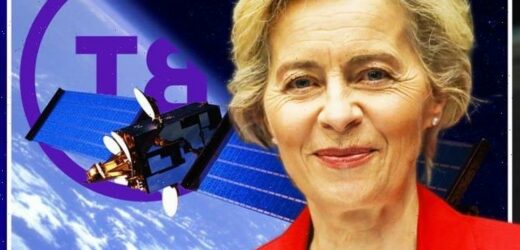Europe showing ‘interest’ in OneWeb says David Morris
We use your sign-up to provide content in ways you’ve consented to and to improve our understanding of you. This may include adverts from us and 3rd parties based on our understanding. You can unsubscribe at any time. More info
BT and OneWeb have agreed to terms for a new Distribution Partner Agreement (DPA). It will see OneWeb provide Low Earth Orbit (LEO) satellite communication services across BT Group. It builds on the initial Memorandum of Understanding signed in July and means BT is testing how the LEO satellite can improve its service.
The agreement will reportedly see BT commence the first live trials with customers from early next year.
Business secretary Kwasi Kwarteng said: “I am thrilled to see the UK at the forefront of this emerging technology thanks to the Government’s investment in OneWeb a crucial part of our plans to cement our status as a global science and technology superpower.”
Digital secretary Nadine Dorries added: “The agreement between OneWeb and BT will help bring fast and reliable global connectivity, from the Highlands to the Himalayas.
“I’m delighted these two British companies have joined forces to research the technological benefits of working together, and I look forward to exploring how this could play a role in our mission to put hard-to-reach areas in the digital fast lane.”


The UK was kicked out of the EU’s Global Navigation Satellite System (GNSS), known as Galileo, when it left the bloc.
The Government, appearing to give up on the dream of building a UK alternative, invested £364million ($500million) to acquire the satellite company OneWeb from bankruptcy, in conjunction with the Indian company Bharti Global.
OneWeb was designed as a broadband constellation first and foremost – it will provide rural 4G, and one day 5G, Internet signals across the nation.
But in the future, it has been tipped to do more, and many believe it will one day rival Galileo.
Philip Jansen, chief executive of BT Group, said: “Space is an emerging and enormous digital opportunity, and this is an important step towards harnessing its potential for BT’s customers across the globe.

“We will put OneWeb’s technology through its paces in our UK labs with the goal of delivering live trials in early 2022.
“Delivered securely and at scale, satellite solutions will be an important part of our plans to expand connectivity throughout the UK and globally, and to further diversify the range of services we can offer our customers.”
OneWeb is expected to deliver global coverage by June 2022 through a constellation of 648 LEO satellites.
It will cover the entire UK from later this year.
The new partnership supports BT’s wider network ambition, set out in July this year, to deliver digital solutions across the entire UK by 2028.
DON’T MISS
China sent warning as UK unveils £100m electronic warfare arsenal [REPORT]
Disease warning as 70m in Africa threatened by parasitic illness [REVEAL]
AstraZeneca and Pfizer jabs linked with new side effect [INSIGHT]

OneWeb’s chief executive officer, Neil Masterson, said: “BT has taken the lead in the recognition of LEO satellite’s advantage.
“We are delighted as this agreement with BT Group represents an important strategic partnership for OneWeb as we continue to make progress towards our operational launch.
“We are excited to be playing such a key role in improving the resilience of the overall telecom infrastructure in the UK.
“OneWeb’s connectivity platform will help bridge the last digital divides across the country and enhance the nation’s digital infrastructure.”
Galileo, which goes live in 2026, features a Public Regulated Service (PRS) that can be used by government agencies, armed forces and emergency services.

The bloc decided this “crucial feature” would only be accessible for EU members, despite the UK developing its “brains and heart”.
But now, OneWeb’s Gen2 satellite is being tipped as a potential Galileo replacement with groundbreaking technology to meet the needs of Government, military, maritime and first responder customers.
It comes after US company Kymeta announced it has successfully tested its u8 broadband terminal on OneWeb’s low-Earth-orbit constellation.
Kymeta and OneWeb performed a series of LEO satellite acquisition, tracking and throughput measurements in Toulouse, France.
It is understood that the technology, could be integrated into the rapidly expanding OneWeb system to allow OneWeb to explore solutions that meet the needs of Government, military, maritime and first responder customers.
OneWeb is working with a portfolio of companies, including Hanwha, which recently invested £200 million in the operator.
Hanwha made the investment via Hanwha Systems, the defence systems division that last year acquired Phasor Solutions, a British satellite antenna start-up.
The group will have a seat on OneWeb’s board.
Source: Read Full Article


